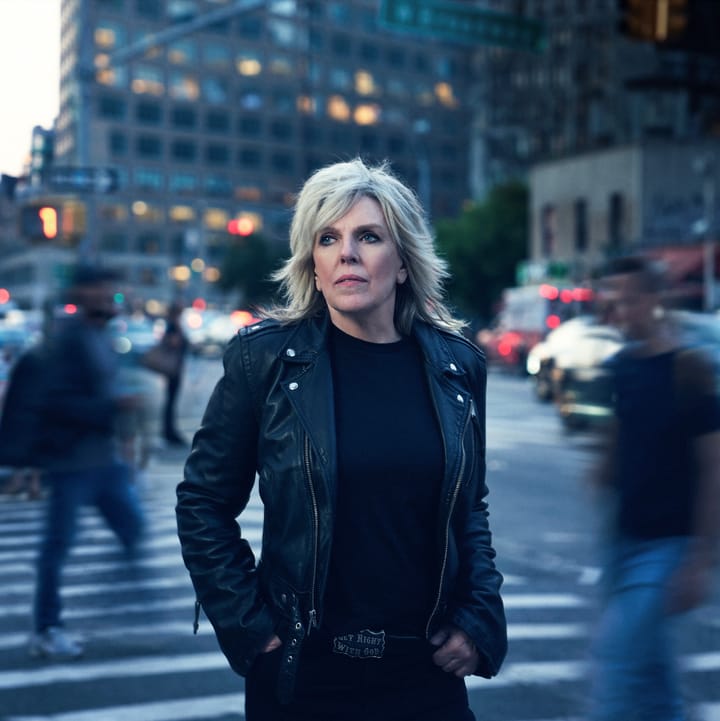"I mostly feel honored to have been able to do for somebody else what music's always done for me: held my hand when I was walking down dark alleys and couldn't see my way out."
"People used to assume I was some crazed loner dude living alone in an apartment or something, like an indie Henry Darger only with alcohol instead of children," says John Darnielle, central songwriter, singer and guitarist for the Mountain Goats. "That used to bother me -- but then I sort of learned to embrace untruths. Now whenever somebody thinks something totally off-base about me, I am fairly well charmed by it: 'Man, I heard you opened a surf wax shop on the North Shore and there are several outstanding bench warrants for your ass!'"
Darnielle is probably the subject of so much mythmaking because he has made a heroic amount of music -- 35 different products to choose from in fifteen years, if you count singles, EPs and full-length albums (not to mention dozens of compilation appearances and side-project releases). Only recently has he admitted to writing songs that are overtly about his own experiences, which has proven to be an interesting shift.
"I was chafed a little bit when I started referring to my hard-drug-fueled adolescence -- people have this image of me as 'professorial,' I think mainly because I use fifteen-cent words sometimes or maybe because I rock the corduroy jacket from time to time," he says. "Anyhow, a few people tried to take me to school about what drugs are 'really like,' et cetera, which amused me more than it rankled me, because the guys who wanted to question my cred on that point were, like, dudes whose ideas about hard drugs mainly came from listening to the Velvets and/or [rapper] Biggie [Smalls]'s 'Ten Crack Commandments'."
Today though, far from being a manic hellion, Darnielle, who has been with his wife Lalitree for ten years, is in some ways a portrait of the healthy, stable, conscientious, disciplined artist. "I'm a vegetarian -- have been since January 1996," he says. "I drink sometimes, no more no less. Yes, I am aware that some alcohol, especially French wines & Guinness Stout, uses animal byproducts in the refining process.
"In the early days of my vegetarianism I might have wrung my hands a lot about that. Now, I don't drink or eat something if I know there are animal parts in it; if I have a Bloody Mary and it turns out there was some Worcestershire in it, which contains anchovies much of the time, I'm not going to run around the house freaking out. Vegetarianism is about me trying on a daily basis to do what I think's right, not a straight-edge scorecard."
Perhaps Darnielle's dinner-table morality is a vestige of his California upbringing. "I went to Mission Nativity Catholic school in San Luis Obispo for preschool, kindergarten and the first grade," he recalls. "Then my family moved up to Milpitas, near San Jose, and this was the opportunity my stepfather had been wanting to get me out of the Catholic schools; he'd been raised that way and hated it. I liked it. The sisters were so nice to me; Sister Mary Claude, my preschool teacher, was the person who taught me how to use a knife and fork together."
This spring, indigent Mountain Goats fans will have to work odd jobs in order to keep up with Darnielle. The new Goats album The Sunset Tree is out April 26 on 4AD (to be followed a vinyl-only collection of demos for the album's songs); his 1994 and 1996 discs Zopilote Machine and Nothing For Juice are being reissued; and the download-only Dilaudid EP is due for purchase via the internet.
Darnielle views his back pages fondly, but he's understandably more excited about his current work. "I hadn't listened to Zopilote and Nothing in years," he says. "I don't listen to my own stuff all too often and am deeply suspicious of any artist who does. So I got them out and listened to them, and had some copies sent to my old bassist Rachel Ware, and we exchanged some e-mails.
"We were both surprised by how much some of that stuff held up; it sounds so young and wild-eyed, you know, when it seemed to us like a great leap in sophistication at the time. I really think that [Nothing For Juice]'s quieter songs are like fingers pointing toward the stuff that I'd be doing in [2000's] The Coroner's Gambit -- looking for a way to encapsulate a special, somewhat dark but also sweet mood inside a very small, very simple song.
"For me, as for most artists, I guess, the recent work just seems better," he continues. "I know that the lyrics are considerably better both on a technical level and on a working level: more people are moved by a song about irrevocable losses like "Cotton" [from 2004's We Shall All Be Healed] than, say, a song about the return of the Aztec god Quetzalcoatl.
"I know that people often accuse artists of shilling their newer stuff just to boost sales or their own egos, but I'm not like that," he insists. "If I thought The Coroner's Gambit or Zopilote Machine were better albums than We Shall All Be Healed, then I'd say so, but to me they're just obviously not. And so for somebody wanting to get acquainted with me at my best, I'd recommend either Healed or The Sunset Tree, both of which seem to offer up my stuff at its best: The Sunset Tree if you like your liquor straight, and Healed if you like it on the rocks after a week-long meth bender."
On its narrative surface, The Sunset Tree chronicles a troubled young adult's teeth-grinding survival and dreams of self-resurrection. The passing of Darnielle's stepfather freed him, in some ways, to examine a rough patch of his life.
"It's an album about growing up in a house where my father had been replaced by my stepfather," he says. "My stepfather was an extremely intelligent, politically passionate person; he also happened to be abusive toward his new family. With personal songs like these, I feel like almost any amount of explication I might give over and above what's in the songs would seem tawdry. I worked really hard to make sure that the album didn't devolve into a therapy session; I think it's pretty raw, but I hope that it's raw in a communicative way, if that makes sense."
Some of the most universal moments on The Sunset Tree involve the speaker's redemptive dependence on music. "Hast Thou Considered The Tetrapod" describes not being able to live without a stereo, and "Dance Music" is about being swept away from domestic tension by upbeat tunes.
Darnielle enjoys being a part of a similar goodwill mechanism with his fans. "I don't believe in the Artist Who Must Create or whose only responsibility is to his own art," he says. "The people who've been kind enough to respond to my songs are my life's blood and I love them.
"Sometimes people who are going through the short dark spurts of earthly hell that everybody at some point goes through will run into my stuff and find it useful during those times, sure, but by the time I get to meet these people, they've usually come out on the other side of it all, and then I mostly feel honored to have been able to do for somebody else what music's always done for me: held my hand when I was walking down dark alleys and couldn't see my way out. I know that this must sound terribly corny, but it's really how I feel, and it's really why I write: for the people who might have some use for what I do."
Darnielle's earnest, romantic streak is probably what imbues his elegies for musicians with such power. His "Last Day Of Jimi Hendrix's Life" (available on the 2002 strays compilation Ghana) stands among the Mountain Goats' finest songs, and The Sunset Tree pours some on the curb for Kurt Cobain, classical pianist Dinu Lipatti, and reggae great Dennis Brown, whose body was ravaged by his appetite for cocaine.
"It's just that always-shocking, never-new conflict between something beautiful and something horrible," Darnielle explains. "Dennis Brown's voice is one of the sweetest things I've ever heard. I really feel it in my soul when I hear it, and the naive part of my listening ear thinks: 'What a lovely man, to sing like that!' And while I'm sure he was a lovely guy in some ways, the end of his life was so awful and sad and terrifying.
"This isn't news; artists aren't their art, they're just people. But the elevated beauty of what he did coupled with the understandable, simple horror of his decline -- I don't know, it reaches me somewhere. There's probably a 'there but for the grace' kinda deal goin' on, which sounds rather contrived maybe, but for me the best part about maturing is worrying less about whether something sounds contrived, and focusing more on whether what it says is true."
In addition to writing so many songs, Darnielle is a widely published music reviewer. His paper zine Last Plane To Jakarta morphed into a regularly updated weblog. "What I do in terms of music writing is less criticism than exultation," he says. "I don't write reviews of things I don't like -- can't be bothered to. What I do is try to express in some way what happens for me when I listen to music that I love or that excites me in some way."
Darnielle defines the songwriters he admires as the following: "Really anybody who's finding very specific aches and roping them into very small enclosures -- into songs, I mean. That kind of mildly sadistic elegance."
His list of preferred practitioners of that art includes his sometime bandmate Franklin Bruno, Kristin Hersh, Hank Williams, Sarah Dougher, Billy Joe Shaver, Merle Haggard, Lerner & Lowe, Jeffrey Lee Pierce, David Berman of the Silver Jews ("tremendous"), Tanya Donelly ("quite great"), Webb Pierce ("incredible...completely unbelievable"), Howlin' Wolf ("terribly underrated"), and the team of Bob Crewe & Bob Gaudio: "They wrote Frankie Valli's biggest hits including the unstoppable 'Can't Take My Eyes Off You'.
"I will defend 'songwriter' as a term describing what [electronic artist] Barbara Morgenstern does over the rather nondescript term 'techno,'" Darnielle continues. "Though now we're into territory a little different from what most people -- not me though -- mean by 'songs,' I would add the work of Gustav Mahler and Franz Schubert."
Though he relishes hip-hop, jazz and metal, he takes a lot of delight in artists whose work falls under the "Whatever That Is" radar of many a No Depression reader. Among his favorite recent albums are the latest efforts by Iron & Wine, South San Gabriel, and the Baptist Generals.
Darnielle is turned off by countrification that approaches caricature, but he understands that most modes of discourse involve degrees of performance. "I always have my ears pricked up for anything that sounds like an affected southern accent," he acknowledges. "There's a whole huge debate one can have about that -- aren't all our speech patterns just well-rehearsed affectations?"
His own songwriting somehow isn't stifled by a self-consciousness or archness that comes from being a consumer of so much music, music press, music critique, and fun gossip about the contemporary scene.
"Writing for me is this sort of exciting physical space that's not really at all like listening critically; I don't think this is in any way inimical to writing songs," Darnielle reasons. "The actual writing is a pretty straightforward process. All the brain-work happens away from the page: when I read, and when I think about what I read, and when I listen to other people's music, and when I think or write about that.
"When I sit down to write a song, I focus on trying to clearly express the mood I think the song wants. I'm never willfully obscure; I write about what thrills me in some way, and I let the images and feelings I get from an image or a phrase play around on the page -- or, usually, out loud.
"My songs begin as improvisations usually. I'll sing a few lines until I come up with something that resonates for me, then write those down, then go back to singing and thinking of rejoinders. By the time I get to the second verse, I've got a framework within which to work, and then it's straight writing."
Somehow, that process yields songs such as the new album's "Up The Wolves", which moves breezily from an almost emo, self-helpy opening to a rousing, sociopathic finale, held together by the chorus' Romulus-and-Remus metaphor. "The Sunset Tree was a pretty difficult record to make," Darnielle admits. "I enjoyed that aspect of it. I like working hard."
William Bowers lives and writes in Gainesville, Florida.




Comments ()